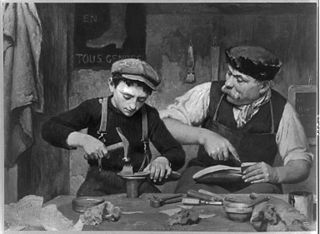
A community college is a type of educational institution. The term can have different meanings in different countries: many community colleges have an "open enrollment" for students who have graduated from high school. The term usually refers to a higher educational institution that provides workforce education and college transfer academic programs. Some institutions maintain athletic teams and dormitories similar to their university counterparts.

Apprenticeship is a system for training a new generation of practitioners of a trade or profession with on-the-job training and often some accompanying study. Apprenticeships can also enable practitioners to gain a license to practice in a regulated occupation. Most of their training is done while working for an employer who helps the apprentices learn their trade or profession, in exchange for their continued labor for an agreed period after they have achieved measurable competencies.

Recreational diver training is the process of developing knowledge and understanding of the basic principles, and the skills and procedures for the use of scuba equipment so that the diver is able to dive for recreational purposes with acceptable risk using the type of equipment and in similar conditions to those experienced during training.

Professional diving is underwater diving where the divers are paid for their work. The procedures are often regulated by legislation and codes of practice as it is an inherently hazardous occupation and the diver works as a member of a team. Due to the dangerous nature of some professional diving operations, specialized equipment such as an on-site hyperbaric chamber and diver-to-surface communication system is often required by law, and the mode of diving for some applications may be regulated.

The Australian Qualifications Framework (AQF) specifies the standards for educational qualifications in Australia. It is administered nationally by the Australian Government's Department of Industry, with oversight from the States and Territories, through the Standing Council of Tertiary Education Skills and Employment. While the AQF specifies the standards, education and training organisations are authorised by accrediting authorities to issue a qualification.
A medical assistant, also known as a "clinical assistant" or healthcare assistant in the USA is an allied health professional who supports the work of physicians, nurse practitioners, physician assistants and other health professionals, usually in a clinic setting. Medical assistants can become certified through an accredited program. Medical assistants perform routine tasks and procedures in a medical clinic.
A national qualifications framework is a formal system describing qualifications. 47 countries participating in the Bologna Process are committed to producing a national qualifications framework. Other countries not part of this process also have national qualifications frameworks.

A medical laboratory scientist (MLS) or clinical laboratory scientist (CLS) or medical technologist (MT) performs diagnostic testing of blood and body fluids in clinical laboratories. The scope of a medical laboratory scientist's work begins with the receipt of patient or client specimens and terminates with the delivery of test results to physicians and other healthcare providers. The utility of clinical diagnostic testing relies squarely on the validity of test methodology. To this end, much of the work done by medical laboratory scientists involves ensuring specimen quality, interpreting test results, data-logging, testing control products, performing calibration, maintenance, validation, and troubleshooting of instrumentation as well as performing statistical analyses to verify the accuracy and repeatability of testing. Medical laboratory scientists may also assist healthcare providers with test selection and specimen collection and are responsible for prompt verbal delivery of critical lab results. Medical Laboratory Scientist in health settings also play an important role in the diagnosis of diseses conditions. An estimated 70% of medical decisions are based on laboratory test results and MLS contributions affect 95% of a health system's costs.
The Master of Public Health or Master of Philosophy in Public Health (M.P.H.), Master of Science in Public Health (MSPH), Master of Medical Science in Public Health (MMSPH) and the Doctor of Public Health (Dr.P.H.), International Masters for Health Leadership (IMHL) are interdisciplinary professional degrees awarded for studies in areas related to public health. The MPH degree focuses on public health practice, as opposed to research or teaching. Master of Public Health programs are available throughout the world in Schools of Public Health, Programs in Public Health, Medical Schools, and Schools of Public Affairs. MPH degrees, in addition to including a core curriculum, will usually also let students pursue a specialization in a specific field, such as epidemiology, biostatistics, or health management.
The Central Institute of Fisheries Nautical and Engineering Training formerly known as the Central Institute of Fisheries Operatives, is a marine studies centre located at Kochi, India. Maintained by the Department of Fisheries and Animal Husbandry and Dairying of the Government of India, the institute was set up to aid research and development in the field.

The Technical Education and Skills Development Authority serves as the Philippines' Technical Vocational Education and Training (TVET) authority. As a government agency, TESDA is tasked to both manage and supervise the Philippines' Technical Education and Skills Development (TESD). Its goals are to develop the Filipino workforce with "world-class competence and positive work values" and to provide quality technical-educational and skills development through its direction, policies, and programs.
The Malaysian Qualifications Framework or the MQF is a unified system of post secondary qualifications offered on a national basis in Malaysia. It is administered by the Malaysian Qualifications Agency (MQA), a statutory body under the purview of the Ministry of Higher Education (MOHE).

The community college system in Malaysia provides a wide range of Technical and Vocational Education Training (TVET) courses. Disciplines covered include accounting, architecture, construction, engineering, draughting, entrepreneurship, hospitality, personal services, multimedia, and visual arts.
The National Healthcareer Association (NHA) is a national professional certification agency for healthcare workers in the United States. Granting credentials in more than 8 allied health specialties, it is an organizational member of the National Organization for Competency Assurance (NOCA). The National Healthcareer Association partners with educational institutions nationwide with over 350,000 certified individuals. It is one of the largest certification and continuing education providers. The National Healthcareer Association works with health training institutions, hospitals, unions, and the US Defense Department through DANTES; it has approved over 2400 training/testing locations throughout the US and in several countries. These institutions offer allied health programs and use the national certification as their "End Of Program Credential." Healthcare professional certification is different from a license such as a Registered Nurse, or a licensed practical nurse. Although certification is not state mandated and/or regulated in all 50 states, most employers and industry organizations prefer their employees to be certified.

A Diving certification or C-card is a document recognizing that an individual or organization authorized to do so, "certifies" that the bearer has completed a course of training as required by the agency issuing the card. This is assumed to represent a defined level of skill and knowledge in underwater diving. Divers carry a qualification record or certification card which may be required to prove their qualifications when booking a dive trip, hiring scuba equipment, filling diving cylinders or in the case of professional divers, seeking employment.
VTAR Institute, abbreviated as VTAR, is a private vocational college located at Kuala Lumpur, Malaysia.
Institut Latihan Perindustrian Kuala Lumpur or its English name Industrial Training Institute of Kuala Lumpur, also known as ILPKL is a public vocational college situated in a 13.7 acre land in Kuchai Lama, suburb of Kuala Lumpur, Malaysia. Founded in 1964 under Jabatan Tenaga Manusia, JTM, ILPKL is one of the oldest institute of technology in Malaysia. It is one of 32 Institut Latihan Jabatan Tenaga Manusia, ILJTM. Today, ILPKL offers 12 courses. Currently under the direction of the 13th director, Abd Halim bin Ali Mohammed, ILPKL is able to accommodate 1100 students at one time.
The National Center for Construction Education and Research, commonly referred to by the acronym NCCER, is a not-for-profit 501(c)(3) education foundation for professional craft certification, formed in 1996.
Recreational scuba certification levels are the levels of skill represented by recreational scuba certification. Each certification level is associated with a specific training standard published by the certification agency, and a training programme associated with the standard., though in some cases recognition of prior learning can apply. These levels of skill can be categorised in several ways:









